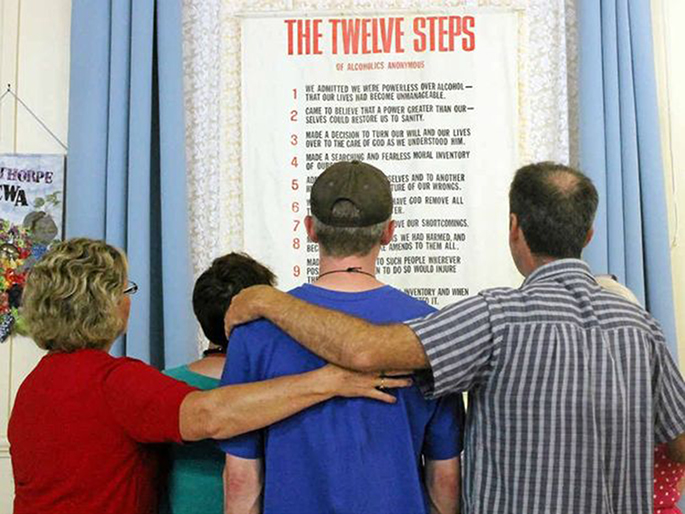
Oct 15, 2016 | Non categorizzato
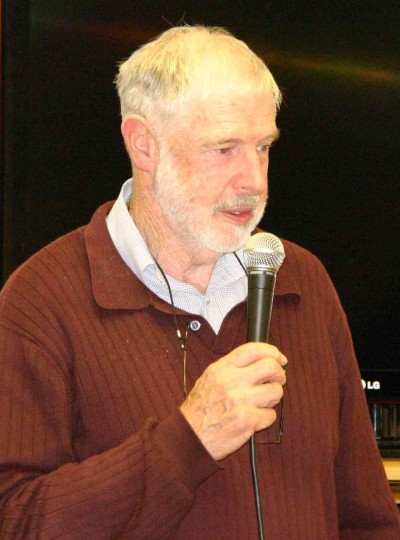
Kevin Kelly
 They were a very spiritual people and working with them, I felt a real bond and a sense of unity of purpose. These ex-alcoholics were very honest with themselves and with each other. Nearly all of them had obtained their sobriety through Alcoholics Anonymous which is a 12-step program. They were ruthless in their self-assessment and refused to give in to resentments and negative feelings. It was a real privilege working with them. At one stage I felt there was a lack of patience with repeat clients. Workers in the field of the homeless and destitute really felt comfortable with the way we respected their clients and used to send people to the centre to sober up. However, this meant that once they were rehabilitated they would often return to their old ways. This was difficult for the ex-alcoholics who invested so much in helping people to recover. In listening to them, I was able to share a maxim I had learned from Chiara Lubich – “to see each person new” – and to live it each time they came into the unit. I emphasized that when people came in again looking for help, we had to see them as though we were seeing them for the first time, even if they had been in many times before. Most of them managed to do this despite the pain it caused them. We had a victory when one fellow, who had a record number of admissions and who was treated by us as a new person each time, suddenly saw the light and gave up drinking altogether. To everyone’s amazement he went on to achieve long term sobriety and even started to help other people! Throughout this experience, I came to see the importance of suffering and the role it played in people’s development. By loving and accepting each person as they were, we were able to be more human in the way we responded to any situation.”
They were a very spiritual people and working with them, I felt a real bond and a sense of unity of purpose. These ex-alcoholics were very honest with themselves and with each other. Nearly all of them had obtained their sobriety through Alcoholics Anonymous which is a 12-step program. They were ruthless in their self-assessment and refused to give in to resentments and negative feelings. It was a real privilege working with them. At one stage I felt there was a lack of patience with repeat clients. Workers in the field of the homeless and destitute really felt comfortable with the way we respected their clients and used to send people to the centre to sober up. However, this meant that once they were rehabilitated they would often return to their old ways. This was difficult for the ex-alcoholics who invested so much in helping people to recover. In listening to them, I was able to share a maxim I had learned from Chiara Lubich – “to see each person new” – and to live it each time they came into the unit. I emphasized that when people came in again looking for help, we had to see them as though we were seeing them for the first time, even if they had been in many times before. Most of them managed to do this despite the pain it caused them. We had a victory when one fellow, who had a record number of admissions and who was treated by us as a new person each time, suddenly saw the light and gave up drinking altogether. To everyone’s amazement he went on to achieve long term sobriety and even started to help other people! Throughout this experience, I came to see the importance of suffering and the role it played in people’s development. By loving and accepting each person as they were, we were able to be more human in the way we responded to any situation.”
Experience shared by Kevin Kelly at the Health Symposium “Darkness to Light – Spirituality of Unity in Chronic Disease and Disability” Focolare Movement, Australia, July 2016
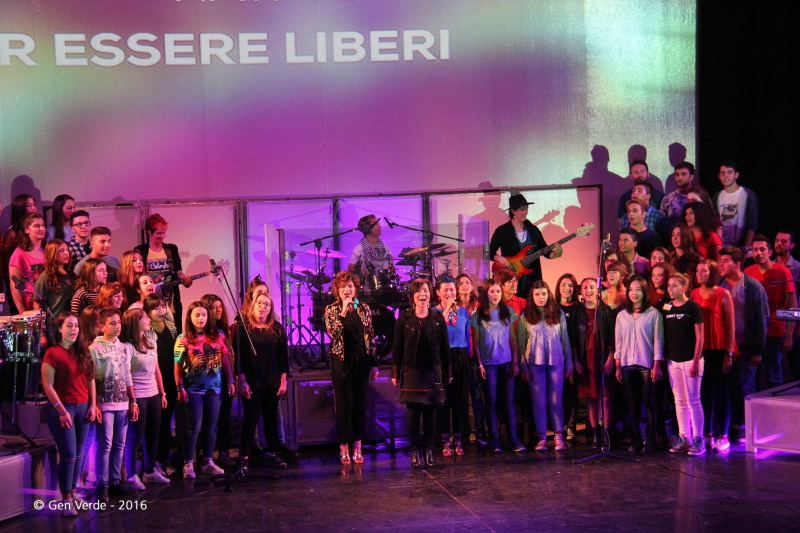
Oct 14, 2016 | Non categorizzato
 LoppianoLab 2016 opened its doors again this year with the theme: the poverty of riches and the wealth of poverty. Persons, institutions, ideas and experiences all played an active part in building a future based on a culture of unity across all fields. Mileni, Gen Verde’s guitarist, described LoppianoLab 2016 as “unique since during it we launched ‘Young people in action’: performing arts workshops dedicated especially to young people looking for a way to build a better future.” So 160 young people mostly from Italy but also including a group of 50 from all over the world took part in this enriching experience of intercultural exchange. Mutual listening and trust reigned in an atmosphere free from prejudice. Mileni explains – “The young people told us that they learned to recognize the needs of those around them and not just their own.” They said: “We can choose: either to ignore those who have difficulties or to help them.” They discovered the miracle of ‘being together’ and the richness that comes from sharing in the small things of everyday life. When asked, “Did you learn anything new here?”, they replied: “we understood the value of solidarity, and helping one another. We learned to value team work. We learned the importance of a having a sense of responsibility and the part each can play in the life of a group. We learned that on our own we can achieve small things but together we can do something great.” They also spoke about the important experience of working with others from a different culture: “we learned to go beyond barriers which could have been there because we speak different languages or come from different places. Instead we found a way of communicating which was very deep and sincere. Together we were able to go beyond moments when we experienced discouragement or failure and discover the joy of singing, dancing or creating music together.” When asked, what will you take from this to your everyday life? The young people replied: “To listen to others. To trust them. Not to stop at my own limits.” And: “We have learned to trust in ourselves more and that people are not always what they seem – first impressions can be wrong! In the very positive atmosphere we experienced here, we learned to eliminate prejudice and get along happily with others.” The event concluded with a bang in an exciting final performance at the Loppiano Auditorium packed with 900 people. They listened intensely and in the end everyone was on their feet as great joy filled the air. Those in the audience said: “I loved the concert – it felt like something really new, modern and extremely relevant in that it touched on issues all of us face.” And, “It was so beautiful, I experienced the strength that comes from diversity. At the end of the concert I would have wanted to say so much, but in the end I remained in silence. In silence to meditate on the values you transmitted to us.” Video
LoppianoLab 2016 opened its doors again this year with the theme: the poverty of riches and the wealth of poverty. Persons, institutions, ideas and experiences all played an active part in building a future based on a culture of unity across all fields. Mileni, Gen Verde’s guitarist, described LoppianoLab 2016 as “unique since during it we launched ‘Young people in action’: performing arts workshops dedicated especially to young people looking for a way to build a better future.” So 160 young people mostly from Italy but also including a group of 50 from all over the world took part in this enriching experience of intercultural exchange. Mutual listening and trust reigned in an atmosphere free from prejudice. Mileni explains – “The young people told us that they learned to recognize the needs of those around them and not just their own.” They said: “We can choose: either to ignore those who have difficulties or to help them.” They discovered the miracle of ‘being together’ and the richness that comes from sharing in the small things of everyday life. When asked, “Did you learn anything new here?”, they replied: “we understood the value of solidarity, and helping one another. We learned to value team work. We learned the importance of a having a sense of responsibility and the part each can play in the life of a group. We learned that on our own we can achieve small things but together we can do something great.” They also spoke about the important experience of working with others from a different culture: “we learned to go beyond barriers which could have been there because we speak different languages or come from different places. Instead we found a way of communicating which was very deep and sincere. Together we were able to go beyond moments when we experienced discouragement or failure and discover the joy of singing, dancing or creating music together.” When asked, what will you take from this to your everyday life? The young people replied: “To listen to others. To trust them. Not to stop at my own limits.” And: “We have learned to trust in ourselves more and that people are not always what they seem – first impressions can be wrong! In the very positive atmosphere we experienced here, we learned to eliminate prejudice and get along happily with others.” The event concluded with a bang in an exciting final performance at the Loppiano Auditorium packed with 900 people. They listened intensely and in the end everyone was on their feet as great joy filled the air. Those in the audience said: “I loved the concert – it felt like something really new, modern and extremely relevant in that it touched on issues all of us face.” And, “It was so beautiful, I experienced the strength that comes from diversity. At the end of the concert I would have wanted to say so much, but in the end I remained in silence. In silence to meditate on the values you transmitted to us.” Video
Oct 13, 2016 | Non categorizzato
16, 17 &18 November: Youth workshops 19 November: Concert “On the Other Side” at the municipal hall in La Spezia (Italy) at 8.30 21 November: Follow up meeting with the young people
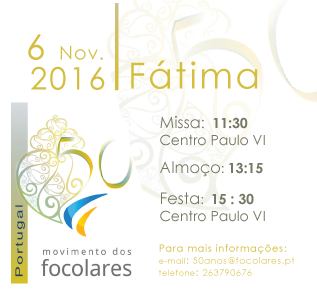
Oct 13, 2016 | Non categorizzato
Celebrations will take place on 6th November in Fatima. All welcome.  Program: 11.30 – Mass in the Paul VI Auditorium 13,15 – Lunch 15,30 – Celebration of the 50th anniversary of the Focolare Movement in Portugal in the Auditorium 17,30 – Conclusion For more information: 50anos@focolares.pt / tel: +351 263 790 676
Program: 11.30 – Mass in the Paul VI Auditorium 13,15 – Lunch 15,30 – Celebration of the 50th anniversary of the Focolare Movement in Portugal in the Auditorium 17,30 – Conclusion For more information: 50anos@focolares.pt / tel: +351 263 790 676
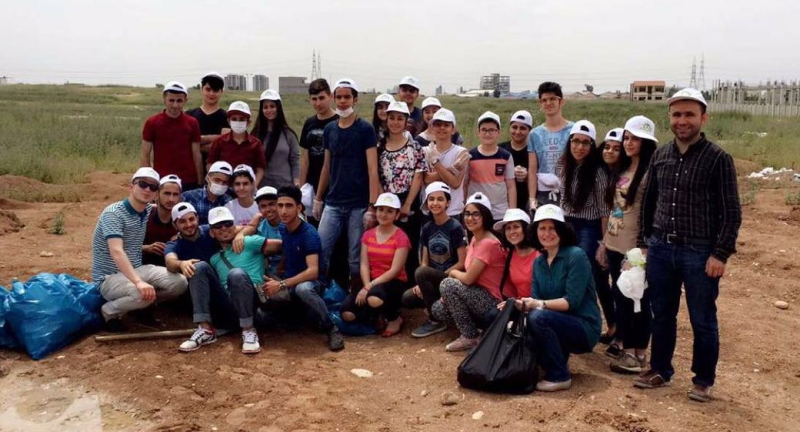
Oct 13, 2016 | Focolare Worldwide
 Political instability, economic uncertainty, corruption, religious extremism, and reduction of educational offers are just some of the causes that push the Iraqi population to an unprecedented migration. The choice to remain in Iraq today is a really difficult decision, especially if you are a Christian. And yet Iraq disposes of remarkable natural resources and its people are endowed with humanity and great inclusion capacities. Just think of the plurality of the cultures, languages, and religions, and the various ethnic groups which for centuries had managed to coexist in peace. The habitat of Christian legacy right at its origins, for 2,000 years Iraq has been the natural home to very lively Christian communities. With the outbreak of wars, however, today it has become the object of discrimination and persecution. The most atrocious even was two years ago, when the ISIS extremists took over Mossul and the surrounding plains: in a few hours thousands of Christians had to abandon their homes. With only the clothes they were wearing, they had to disperse amid numberless dangers and discomforts, towards Jordan or Lebanon where they found refuge in makeshift refugee camps. Some statistics say that the Christians in Iraq counted 1.5 million (2003), and today number 300,000. Also the Focolare community has suffered the devastating effects of this barbarity. But both those who left the country and those who remained – concentrated in the cities of Erbil, Baghdad, Bassura, and Dohuk – try to transmit peace everywhere, building bridges of solidarity. However, while in the typical summer meetings of the Focolare in the past, the Mariapolis saw the participation of 400 people, and in those held from 9 to 11 September this year, only 40 attended. But the numerical drop has not influenced the qualitative profile which has definitely grown in intensity and depth, also because the central theme focused on interpersonal relationships undertaken in the spirit of mercy. Hosted in Sulaymaniya, close to the border with Iran, the participants lived three days of an authentic training in mutual love. Racconta Rula, focolarina from Jordan and now in the focolare house of Erbil: «We prayed, played, took walks in a family atmosphere, experiencing real communion. During the session dedicated to the family, the spirit of sharing created allowed us to talk about relationships as couples, the challenge of migration, conciliation of work and family, education of the children… while the youths, through choreographies, showed how one we can become bridges towards the others.» The Mariapolis was also visited by the Bishop of Baghdad, Bishop Salomone, who inflamed all with his words: «Jesus wants us to become yeast for this world. I am pleased that you chose this city for your meeting, and even if you are only a few, you will surely leave in this place that typical imprint of those who are seriously committed to living the Gospel.» The focolare tries to support those who have remained, as also those who have decided to leave, precisely because they are aware of the difficulties of living without being able to plan one’s future, especially for the youth. «We see that albeit the fact of living abroad – continues Rula – they still want to remain in contact. A young boy wrote us from the refugee camp, saying that the spirituality of unity is the only light that is his support and that trying to love others gives a meaning to the unnerving wait they are undergoing.» Among the many experiences shared in the Mariapolis, is the emblematic one of a surgeon in a public hospital. Since the doctors do not receive their salaries regularly, they try to plan the operations for the afternoon, when these are private and paid operations. But he decided to help as many people as possible by scheduling the appointments in the morning. At first, his colleagues criticized him, but slowly they began to do the same.
Political instability, economic uncertainty, corruption, religious extremism, and reduction of educational offers are just some of the causes that push the Iraqi population to an unprecedented migration. The choice to remain in Iraq today is a really difficult decision, especially if you are a Christian. And yet Iraq disposes of remarkable natural resources and its people are endowed with humanity and great inclusion capacities. Just think of the plurality of the cultures, languages, and religions, and the various ethnic groups which for centuries had managed to coexist in peace. The habitat of Christian legacy right at its origins, for 2,000 years Iraq has been the natural home to very lively Christian communities. With the outbreak of wars, however, today it has become the object of discrimination and persecution. The most atrocious even was two years ago, when the ISIS extremists took over Mossul and the surrounding plains: in a few hours thousands of Christians had to abandon their homes. With only the clothes they were wearing, they had to disperse amid numberless dangers and discomforts, towards Jordan or Lebanon where they found refuge in makeshift refugee camps. Some statistics say that the Christians in Iraq counted 1.5 million (2003), and today number 300,000. Also the Focolare community has suffered the devastating effects of this barbarity. But both those who left the country and those who remained – concentrated in the cities of Erbil, Baghdad, Bassura, and Dohuk – try to transmit peace everywhere, building bridges of solidarity. However, while in the typical summer meetings of the Focolare in the past, the Mariapolis saw the participation of 400 people, and in those held from 9 to 11 September this year, only 40 attended. But the numerical drop has not influenced the qualitative profile which has definitely grown in intensity and depth, also because the central theme focused on interpersonal relationships undertaken in the spirit of mercy. Hosted in Sulaymaniya, close to the border with Iran, the participants lived three days of an authentic training in mutual love. Racconta Rula, focolarina from Jordan and now in the focolare house of Erbil: «We prayed, played, took walks in a family atmosphere, experiencing real communion. During the session dedicated to the family, the spirit of sharing created allowed us to talk about relationships as couples, the challenge of migration, conciliation of work and family, education of the children… while the youths, through choreographies, showed how one we can become bridges towards the others.» The Mariapolis was also visited by the Bishop of Baghdad, Bishop Salomone, who inflamed all with his words: «Jesus wants us to become yeast for this world. I am pleased that you chose this city for your meeting, and even if you are only a few, you will surely leave in this place that typical imprint of those who are seriously committed to living the Gospel.» The focolare tries to support those who have remained, as also those who have decided to leave, precisely because they are aware of the difficulties of living without being able to plan one’s future, especially for the youth. «We see that albeit the fact of living abroad – continues Rula – they still want to remain in contact. A young boy wrote us from the refugee camp, saying that the spirituality of unity is the only light that is his support and that trying to love others gives a meaning to the unnerving wait they are undergoing.» Among the many experiences shared in the Mariapolis, is the emblematic one of a surgeon in a public hospital. Since the doctors do not receive their salaries regularly, they try to plan the operations for the afternoon, when these are private and paid operations. But he decided to help as many people as possible by scheduling the appointments in the morning. At first, his colleagues criticized him, but slowly they began to do the same.
Oct 13, 2016 | Non categorizzato
https://vimeo.com/182970045
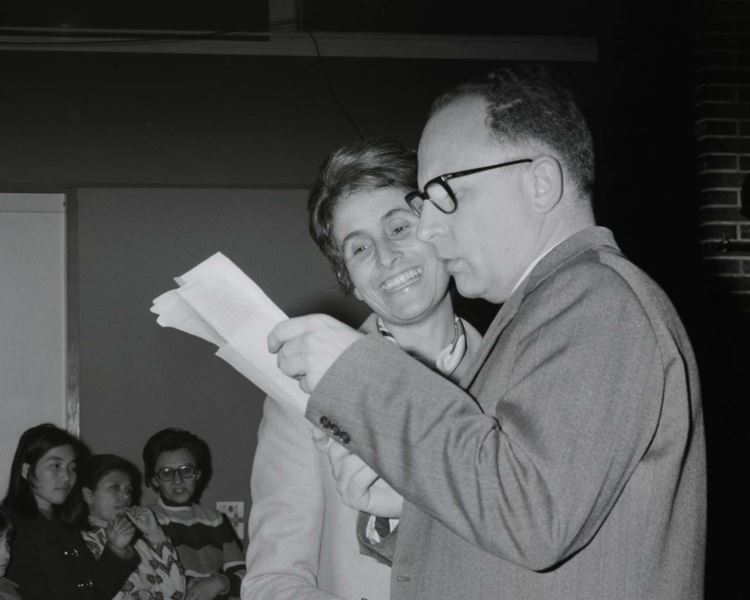
Oct 12, 2016 | Non categorizzato
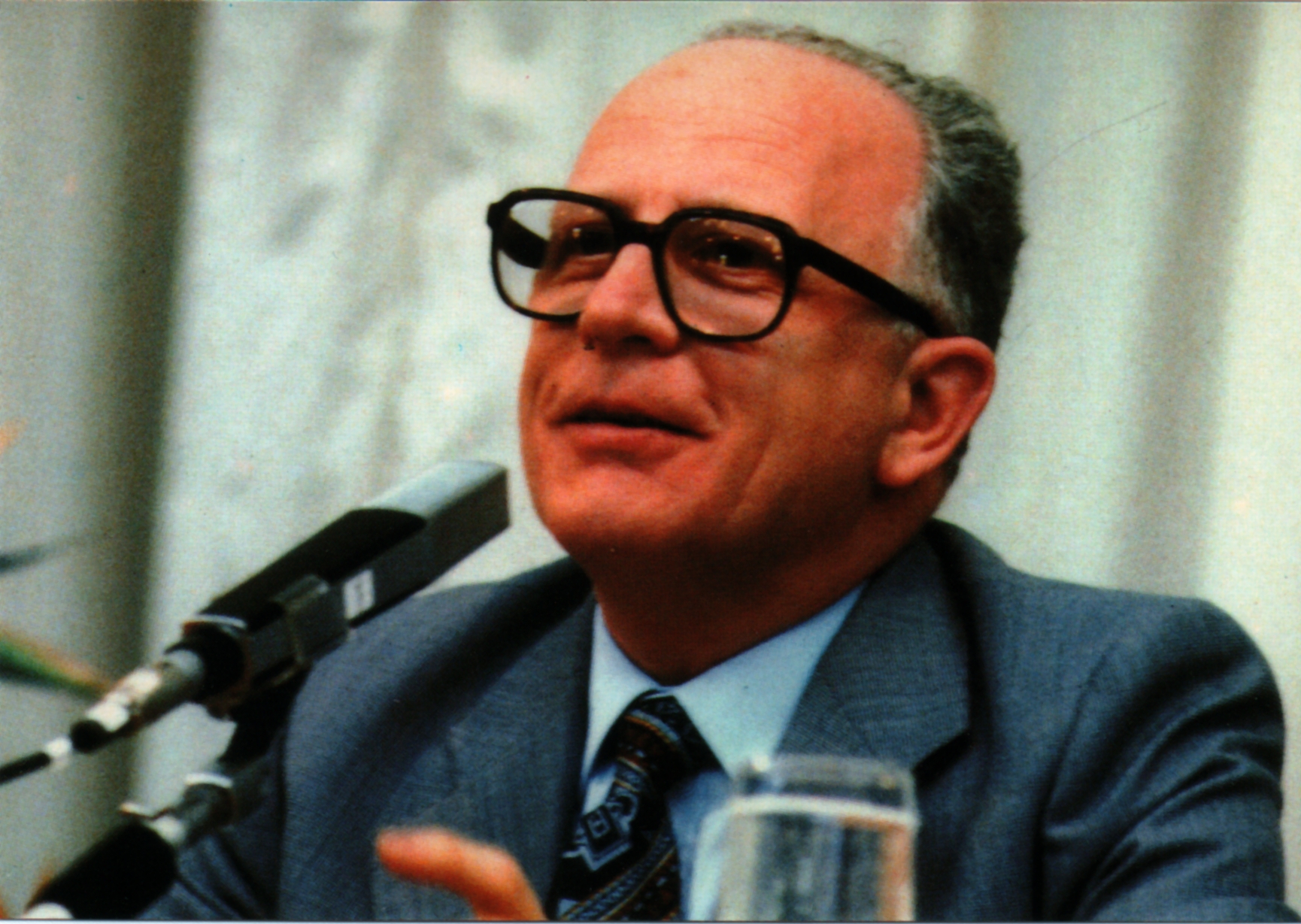 Lionello was born on October 10, 1925 in Parma, Italy. His family was wealthy and raised him to be honest and genuine. He attended high school during World War II and his attention was drawn toward civil society and social problems. In 1943 he enrolled in Law School and graduated with honors in 1947 after having done some prison time for providing help to the partisan movement. After the war he oversaw the educational and cultural activities of the Italian Catholic University Students, as well as the political activities of the Christian Democrats. He served the poor in the Saint Vincent de Paul Society, but feared becoming bourgeois. He joined in an initiative for young people who wanted to deepen their spiritual lives in the light of the Gospel. There he came to know Chiara Lubich‘s spirituality of unity and, in January 1950, Ginetta Calliari, one of the first focolarine. He recalls: “She spoke rather simply, but with quite a bit of conviction. […] The Christianity she was describing seemed so fascinating and fresh that it felt like I was hearing for the first time what Christianity was all about.” This spiritual growth was followed by professional growth becoming Italy’s youngest magistrate. In 1953 he attended the summer Mariapolis where he was immersed in the spirituality of unity. He met Chiara Lubich, Pasquale Foresi and Igino Giordani. Those days would mark his life forever. He remembers them in this way: “That community even though small had a certain completeness of its own: there were consecrated virgins and married couples, people that were not lacking in defects and naivetey. It was an organism into which the Lord had deposited a light, a law, a treasure that was destined to spread to the whole world.” At that Mariapolis he decided to consecrate his life to God in a focolare community. In 1961 he caused a bit of a stir when he left his profession (in the meantime he had been appointed Deputy Prosecutor of the Parma Judiciary) and dedicated himself completely to the Focolare. The weekly newspaper published an article on this Magistrate who had “given up the toga for a Bible.” In 1962 he was awarded the Premio della bontà (Goodness Award) by the Emilia Region of North Italy.
Lionello was born on October 10, 1925 in Parma, Italy. His family was wealthy and raised him to be honest and genuine. He attended high school during World War II and his attention was drawn toward civil society and social problems. In 1943 he enrolled in Law School and graduated with honors in 1947 after having done some prison time for providing help to the partisan movement. After the war he oversaw the educational and cultural activities of the Italian Catholic University Students, as well as the political activities of the Christian Democrats. He served the poor in the Saint Vincent de Paul Society, but feared becoming bourgeois. He joined in an initiative for young people who wanted to deepen their spiritual lives in the light of the Gospel. There he came to know Chiara Lubich‘s spirituality of unity and, in January 1950, Ginetta Calliari, one of the first focolarine. He recalls: “She spoke rather simply, but with quite a bit of conviction. […] The Christianity she was describing seemed so fascinating and fresh that it felt like I was hearing for the first time what Christianity was all about.” This spiritual growth was followed by professional growth becoming Italy’s youngest magistrate. In 1953 he attended the summer Mariapolis where he was immersed in the spirituality of unity. He met Chiara Lubich, Pasquale Foresi and Igino Giordani. Those days would mark his life forever. He remembers them in this way: “That community even though small had a certain completeness of its own: there were consecrated virgins and married couples, people that were not lacking in defects and naivetey. It was an organism into which the Lord had deposited a light, a law, a treasure that was destined to spread to the whole world.” At that Mariapolis he decided to consecrate his life to God in a focolare community. In 1961 he caused a bit of a stir when he left his profession (in the meantime he had been appointed Deputy Prosecutor of the Parma Judiciary) and dedicated himself completely to the Focolare. The weekly newspaper published an article on this Magistrate who had “given up the toga for a Bible.” In 1962 he was awarded the Premio della bontà (Goodness Award) by the Emilia Region of North Italy.

Loppiano: Lionello Bonfanti e Renata Borlone
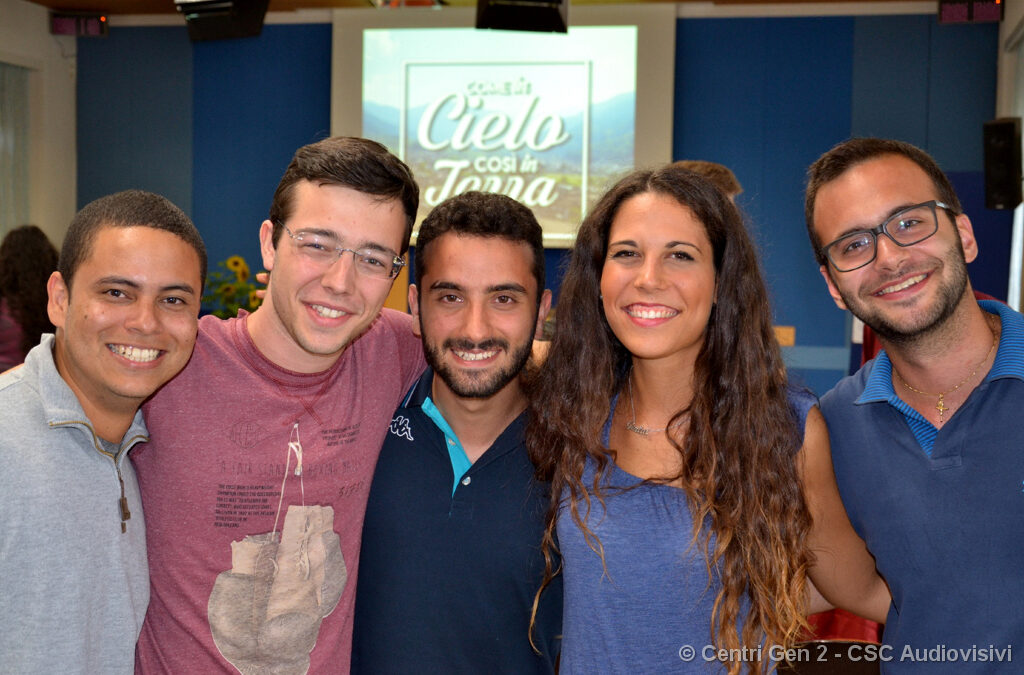
Oct 12, 2016 | Non categorizzato
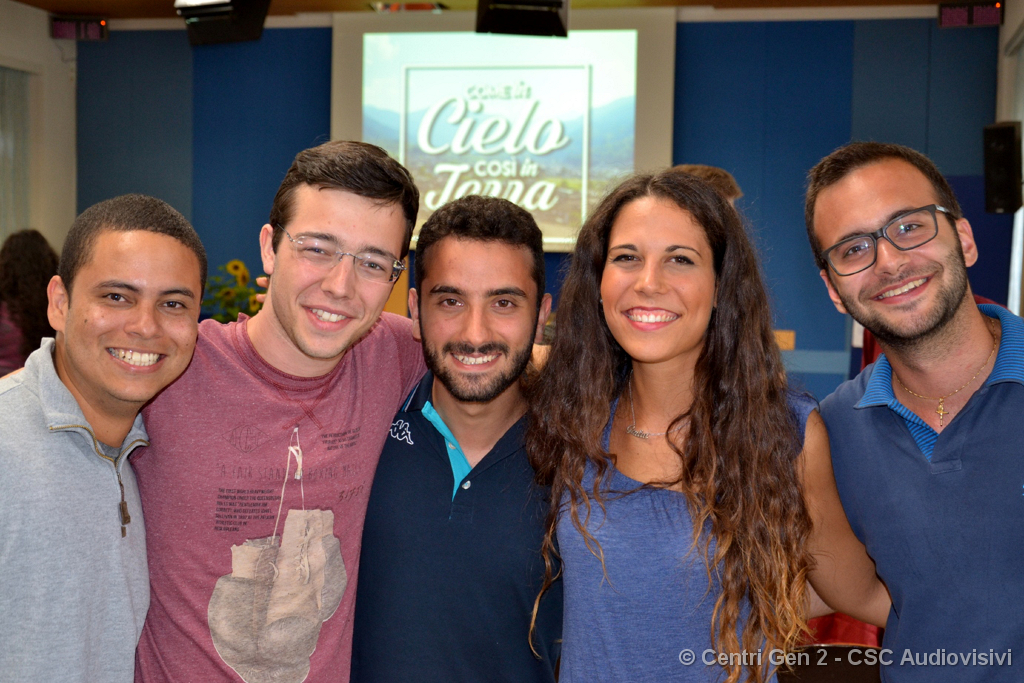 The XV General Assembly of the Synod of Bishops, to be held in October 2018, will focus on “Young people, the faith and discerment of vocation”. This decision of Pope Francis arouses joy and interest even in the Focolare Movement, especially in its branches for young members. The new generations have always been essential to the life of the Movement, in reciprocity with adult members, who accompany the young ones also in discerning their life goals. Here are some first impressions shared by young members of the Focolare in reaction to the news: “This is good news and it is also a response. The choice corresponds to the need. We already try to live our vocation in a bond with our faith, and not merely as a choice. It is time that these two realities are unified in our lives. We are so happy that the Pope has thought of us!”. (Gloria, Uganda) “Great news. If young people are not offered a good environment in today’s Church, tomorrow’s Church will lack good culture. I think Pope Francis wants to leave the Church in good hands. We need good ideas about living the vocation, not just about future choices: getting married, becoming a priest, a religious, a focolarino….In my Focolare formation I have learnt to consider the vocation as an anwer to a call that has to be lived also presently, right away. I hope that the Synod will also focus on this aspect so that the Church will be in good hands”. (Ryan, USA) “It’s a surprise! I am sure the Pope knows how to get to all young people. Many of those who no longer participate in the life Church, have shown great interest in his encyclical on the environment. I consider this synod as a great opportunity. It will be fantastic if it reaches everyone”. (Amanda, Brazil) “What I have learnt from the Catholic Church in the State where I grew up differs in certain aspects from its teaching in another State. Ideas vary even though the same material, as for example Youcat, is used. Globalization and social media put us in contact even with what the Church teaches in other parts of the world. Differences in approach on important issues can cause confusion in the absense of a clear voice.The Pope and the universal Church have a very important role in this, while they take into consideration the different cultures. I think the Synod offers excellent prospects”. (Aileen, India) “Young people are getting to know more about Church problems, especially about hot issues: scandals, social problems, Church and politics. In Peru, for example, such issues cause further distance between the position of the clergy and the reality of youth. The news of the Synod fills me with hope: the contribution and the ideas of the youth,using the media and the social networks in a transparent and convergent manner, can show a more human face of the Church.” (Jorge, Peru) “I grew up in the parish, and I think that the theme on vocation and youth should have been addressed years ago. Today we are in the midst of a crisis of vocations: family, religious life, as citizens, etc. So I say: Well done for chosing this theme”. (Damián, Argentina) “World Youth Days have shown the Church’s openness towards youth. Giving priority to youth shows that Pope Francis now wants to pass from words to deeds; even because we have to be the ones to find solutions for world problems. Sometimes one tends to think that we are unable to address problems, but together with mature and experienced persons we do arrive to solutions. It seems as if the Pope is telling us: you are ready for this challenge”. (Jorge, El Salvador) “Who knows what will really happen during the Synod! It would be great if some young people would actually be present. I think we all wish to have someone voicing us in this Synod”. (Jose Luis, Brazil) The young people of the Focolare Movement are also pleased because the Synod will take place just after the Genfest, when young people from the five continents will be gather in Manila, in July 2018. “This is a marvellous coincidence. We will be in the Philippines, in a continent with so many young people and to whom the Pope gives much attention. This time of preparation will help us understand how we can contribute towards the Synod”. (Jose Luis, Colombia) Source: Press releases (OFFICIAL INTERNATIONAL WEBSITE)
The XV General Assembly of the Synod of Bishops, to be held in October 2018, will focus on “Young people, the faith and discerment of vocation”. This decision of Pope Francis arouses joy and interest even in the Focolare Movement, especially in its branches for young members. The new generations have always been essential to the life of the Movement, in reciprocity with adult members, who accompany the young ones also in discerning their life goals. Here are some first impressions shared by young members of the Focolare in reaction to the news: “This is good news and it is also a response. The choice corresponds to the need. We already try to live our vocation in a bond with our faith, and not merely as a choice. It is time that these two realities are unified in our lives. We are so happy that the Pope has thought of us!”. (Gloria, Uganda) “Great news. If young people are not offered a good environment in today’s Church, tomorrow’s Church will lack good culture. I think Pope Francis wants to leave the Church in good hands. We need good ideas about living the vocation, not just about future choices: getting married, becoming a priest, a religious, a focolarino….In my Focolare formation I have learnt to consider the vocation as an anwer to a call that has to be lived also presently, right away. I hope that the Synod will also focus on this aspect so that the Church will be in good hands”. (Ryan, USA) “It’s a surprise! I am sure the Pope knows how to get to all young people. Many of those who no longer participate in the life Church, have shown great interest in his encyclical on the environment. I consider this synod as a great opportunity. It will be fantastic if it reaches everyone”. (Amanda, Brazil) “What I have learnt from the Catholic Church in the State where I grew up differs in certain aspects from its teaching in another State. Ideas vary even though the same material, as for example Youcat, is used. Globalization and social media put us in contact even with what the Church teaches in other parts of the world. Differences in approach on important issues can cause confusion in the absense of a clear voice.The Pope and the universal Church have a very important role in this, while they take into consideration the different cultures. I think the Synod offers excellent prospects”. (Aileen, India) “Young people are getting to know more about Church problems, especially about hot issues: scandals, social problems, Church and politics. In Peru, for example, such issues cause further distance between the position of the clergy and the reality of youth. The news of the Synod fills me with hope: the contribution and the ideas of the youth,using the media and the social networks in a transparent and convergent manner, can show a more human face of the Church.” (Jorge, Peru) “I grew up in the parish, and I think that the theme on vocation and youth should have been addressed years ago. Today we are in the midst of a crisis of vocations: family, religious life, as citizens, etc. So I say: Well done for chosing this theme”. (Damián, Argentina) “World Youth Days have shown the Church’s openness towards youth. Giving priority to youth shows that Pope Francis now wants to pass from words to deeds; even because we have to be the ones to find solutions for world problems. Sometimes one tends to think that we are unable to address problems, but together with mature and experienced persons we do arrive to solutions. It seems as if the Pope is telling us: you are ready for this challenge”. (Jorge, El Salvador) “Who knows what will really happen during the Synod! It would be great if some young people would actually be present. I think we all wish to have someone voicing us in this Synod”. (Jose Luis, Brazil) The young people of the Focolare Movement are also pleased because the Synod will take place just after the Genfest, when young people from the five continents will be gather in Manila, in July 2018. “This is a marvellous coincidence. We will be in the Philippines, in a continent with so many young people and to whom the Pope gives much attention. This time of preparation will help us understand how we can contribute towards the Synod”. (Jose Luis, Colombia) Source: Press releases (OFFICIAL INTERNATIONAL WEBSITE)
Oct 11, 2016 | Non categorizzato
For more information about the inauguration of Academic Year 2016/17, and to follow the live streaming of the event, visit official website: www.iu-sophia.org Official invitation (Italian)
Oct 11, 2016 | Non categorizzato
The congress, which takes place every three years, will this year include the 50th anniversary celebrations of the Gen Movement, the “new generation” of the Focolare Movement. In 1966, Chiara Lubich launched the “Revolution of Love” to the young people who were part of the Focolare. She explained that this meant aiming towards the fulfillment of Jesus’ testament “May they all be one”. Thousands of young people responded to this appeal and the Gen Movement was born. It spread throughout the world with members of every race, creed and social backgrounds. It also has the following of many young people who have no religious belief.


 They were a very spiritual people and working with them, I felt a real bond and a sense of unity of purpose. These ex-alcoholics were very honest with themselves and with each other. Nearly all of them had obtained their sobriety through Alcoholics Anonymous which is a 12-step program. They were ruthless in their self-assessment and refused to give in to resentments and negative feelings. It was a real privilege working with them. At one stage I felt there was a lack of patience with repeat clients. Workers in the field of the homeless and destitute really felt comfortable with the way we respected their clients and used to send people to the centre to sober up. However, this meant that once they were rehabilitated they would often return to their old ways. This was difficult for the ex-alcoholics who invested so much in helping people to recover. In listening to them, I was able to share a maxim I had learned from Chiara Lubich – “to see each person new” – and to live it each time they came into the unit. I emphasized that when people came in again looking for help, we had to see them as though we were seeing them for the first time, even if they had been in many times before. Most of them managed to do this despite the pain it caused them. We had a victory when one fellow, who had a record number of admissions and who was treated by us as a new person each time, suddenly saw the light and gave up drinking altogether. To everyone’s amazement he went on to achieve long term sobriety and even started to help other people! Throughout this experience, I came to see the importance of suffering and the role it played in people’s development. By loving and accepting each person as they were, we were able to be more human in the way we responded to any situation.”
They were a very spiritual people and working with them, I felt a real bond and a sense of unity of purpose. These ex-alcoholics were very honest with themselves and with each other. Nearly all of them had obtained their sobriety through Alcoholics Anonymous which is a 12-step program. They were ruthless in their self-assessment and refused to give in to resentments and negative feelings. It was a real privilege working with them. At one stage I felt there was a lack of patience with repeat clients. Workers in the field of the homeless and destitute really felt comfortable with the way we respected their clients and used to send people to the centre to sober up. However, this meant that once they were rehabilitated they would often return to their old ways. This was difficult for the ex-alcoholics who invested so much in helping people to recover. In listening to them, I was able to share a maxim I had learned from Chiara Lubich – “to see each person new” – and to live it each time they came into the unit. I emphasized that when people came in again looking for help, we had to see them as though we were seeing them for the first time, even if they had been in many times before. Most of them managed to do this despite the pain it caused them. We had a victory when one fellow, who had a record number of admissions and who was treated by us as a new person each time, suddenly saw the light and gave up drinking altogether. To everyone’s amazement he went on to achieve long term sobriety and even started to help other people! Throughout this experience, I came to see the importance of suffering and the role it played in people’s development. By loving and accepting each person as they were, we were able to be more human in the way we responded to any situation.”





 Lionello was born on October 10, 1925 in Parma, Italy. His family was wealthy and raised him to be honest and genuine. He attended high school during World War II and his attention was drawn toward civil society and social problems. In 1943 he enrolled in Law School and graduated with honors in 1947 after having done some prison time for providing help to the partisan movement. After the war he oversaw the educational and cultural activities of the Italian Catholic University Students, as well as the political activities of the Christian Democrats. He served the poor in the Saint Vincent de Paul Society, but feared becoming bourgeois. He joined in an initiative for young people who wanted to deepen their spiritual lives in the light of the Gospel. There he came to know
Lionello was born on October 10, 1925 in Parma, Italy. His family was wealthy and raised him to be honest and genuine. He attended high school during World War II and his attention was drawn toward civil society and social problems. In 1943 he enrolled in Law School and graduated with honors in 1947 after having done some prison time for providing help to the partisan movement. After the war he oversaw the educational and cultural activities of the Italian Catholic University Students, as well as the political activities of the Christian Democrats. He served the poor in the Saint Vincent de Paul Society, but feared becoming bourgeois. He joined in an initiative for young people who wanted to deepen their spiritual lives in the light of the Gospel. There he came to know 
 The XV General Assembly of the Synod of Bishops, to be held in October 2018, will focus on “Young people, the faith and discerment of vocation”. This decision of Pope Francis arouses joy and interest even in the
The XV General Assembly of the Synod of Bishops, to be held in October 2018, will focus on “Young people, the faith and discerment of vocation”. This decision of Pope Francis arouses joy and interest even in the